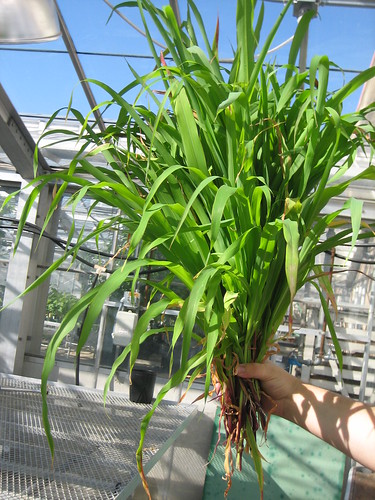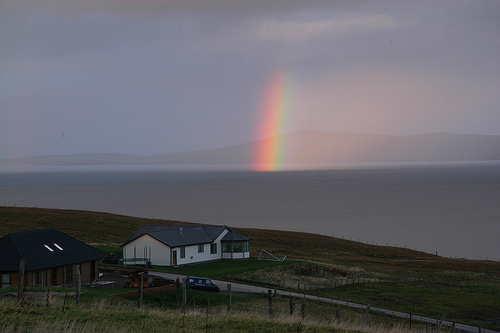(This entry, and the following one were written last night and are being posted today, now that I have the time to get internet access.)
This time I have seven. Three with faculty, and four with the labs of absent professors. And I can honestly say that I walked out of each interview very excited about the science in that lab. Also, it was nice and sunny today which was a vast improvement on yesterday.
Very briefly, I interviewed with a guy who does phytochrome research, which is what my undergraduate research started out in, so I was able to talk intellegently about that, and he knew the guy I work for at school. The meeting was very VERY brief though, they drove us out to the PGEC for an hour and I was scheduled to meet with three groups during that time. The second woman I talked to studies the regulation of cell differentiation in meristems. If I was less tired I could talk about that in a lot more detail, but the sobering part was when I realized her research was behind about a third of what we had learned about shoot meristems in my plant development course last fall. But once more fascinating (I’ll be using that word a lot.) Then a meeting with a lab group whose PI wasn’t in town, but I thought they managed it quite well, some of their work ties in with the Ramosa mutants I worked with several summers ago, and it was, you guessed it, fascinating. Then it was back to Berkeley’s main campus for lunch and MORE interviews. I was fortunate in that most of the on campus people seem to be centered in one building, the microbiology people had to run around to a lot more buildings.
Another thing that both I and a couple of the other people who are interviewing noticed was that the grad student’s here at Berkelely seem happy. I haven’t been to any schools where all the grad students seems depressed, but there does seem to be a lot of variation.
But my first interview of the afternoon was particularly exciting, I promise I’ll be very brief with the last three. It was with a woman who studies plant evolution in all sorts of REALLY weird species. Like cycads. Which are gynosperms (a group of non-flowering plants which include things like pine trees) which pollinate each other by using insects. The insects are drawn to both the male and female cycad cones. But the cones heat up on alternating schedules driving the insects out of male cones, where they’ve been coated in pollen, to the female cones, where they fertilize individual seeds. (The fact that this plant is able to generate heat, vaguely like a warm blooded mammal is pretty cool in of itself.) And then we ended up in a discussion of how cycads may have more trouble spreading their seeds now that dinosaurs are extinct. So that was really cool. As I promised, I’ll mostly skip over the last three labs, not because I was any less fascinated, but because it’s harder to describe. An imprinting lab, a epigenetics lab, and an genomics/bioinformatics/evolution lab. In the last of the three we learned about how transposons can be “domesticated” and adapted to serve a purpose within the host species. The guy I was talking to claims that’s actually the origin of the immune system in animals. Complicated story there, I’ll try to explain it if anyone asks.
Best Metaphor: “Some labs are like viking ships and some labs are like dingies.” (And dingies are the good ones)
Most “I’m definitely a potential grad student” moment:
“Um…wait…I can’t remember his name but he works on a species called bracopodia.” <– I’m better at remembing the names of new species of grass than of the people I meet who study them.

